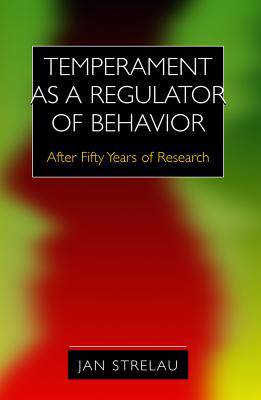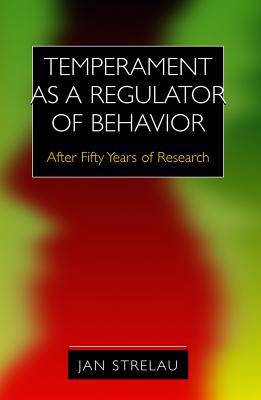
- Retrait gratuit dans votre magasin Club
- 7.000.000 titres dans notre catalogue
- Payer en toute sécurité
- Toujours un magasin près de chez vous
- Retrait gratuit dans votre magasin Club
- 7.000.000 titres dans notre catalogue
- Payer en toute sécurité
- Toujours un magasin près de chez vous
Temperament as a Regulator of Behavior
After Fifty Years of Research
Jan Strelau
Livre relié | Anglais
136,95 €
+ 273 points
Description
A CHOICE Outstanding Academic Title for 2008 Nature or nurture? Are individuals born as an empty slate and shaped by their environment or are we already programmed to react in certain ways? Strelau (emeritus, psychology, Warsaw University; since 1998 professor at the Warsaw School of Social Psychology) has spent more than fifty years studying this age-old question. He bases some of his conclusions on the pioneering work of the Russian physiologist Ivan Pavlov but carries them into the twenty-first century by including genetic studies. Strelau intends this book to provide a framework for others studying the field. He spends several chapters on methodology. He also gives the results of his studies, primarily on how different people react in stressful situations. From Reference and Research Book News . . . "Nature or nurture? Are individuals born as an empty slate and shaped by their environment or are we already programmed to react in certain ways? Jan Strelau has spent more than fifty years studying this age-old question. He bases some of his conclusions on the pioneering work of the Russian physiologist Ivan Pavlov but carries them into the twenty-first century by including genetic studies. Strelau intends this book to provide a framework for others studying the field. He spends several chapters on methodology. He also gives the results of his studies, primarily on how different people react in stressful situations." From the Foreword . . . "Psychology can be a faddish field, not really solving problems but tiring of them and then running after a new fad. What I admire most is the systematic nature of Strelau's fifty-year program of research. This book demonstrates the value of such long-term dedication to a systematic program of research." Robert Plomin, King's College London From the reviews . . . "Jan Strelau chronicles his courageous 50-year-long investigation of temperament . . . culminating in . . . the regulative theory of temperament. . . . Strelau's focus on the regulative aspect of temperament offers important insights for further research to advance our understanding of how temperament affects our actions, especially in stressful circumstances." Patricia T. Ashton in PsycCRITIQUES "The importance of Strelau's research . . . makes this book indispensable. . . . Strelau has managed the rare achievement of bequeathing a theory of which not only he and his students, collaborators, and disciples can be proud, but indeed the entire field of differential psychology." K. V. Petrides in Personality and Individual Differences "[A]n impressive and powerful book . . . . Strelau . . . has avoided the temptation to temper and alter his theory as psychology has waxed and waned with theories of personality . . . . This is a must read for anyone interested in the history of the discipline and/or working in the arena of personality psychology." Prepublication praise . . . "In this exciting new book, Jan Strelau continues to carry on the tradition begun by Ivan Pavlov on temperament. Strelau's writing and the important research described in the book illuminate our understanding of temperament and show us how to apply this understanding to our work and life. Highly recommended to all in the areas of temperament, personality, and individual differences." Mary K. Rothbart, University of Oregon "Jan Strelau's book is of considerable importance to all scientists who study the biological and behavioral bases of individual differences in temperament. His Regulative Theory of Temperament and the resulting FCB-TI for assessing temperament provide a rich and dynamic framework for the study of temperament." Donald H. Saklofske, University of Calgary
Spécifications
Parties prenantes
- Auteur(s) :
- Editeur:
Contenu
- Nombre de pages :
- 271
- Langue:
- Anglais
Caractéristiques
- EAN:
- 9780975273890
- Date de parution :
- 01-08-08
- Format:
- Livre relié
- Format numérique:
- Genaaid
- Dimensions :
- 157 mm x 231 mm
- Poids :
- 521 g







